UANI Launches Starlink Internet Project To Bypass Iran's State Blockage
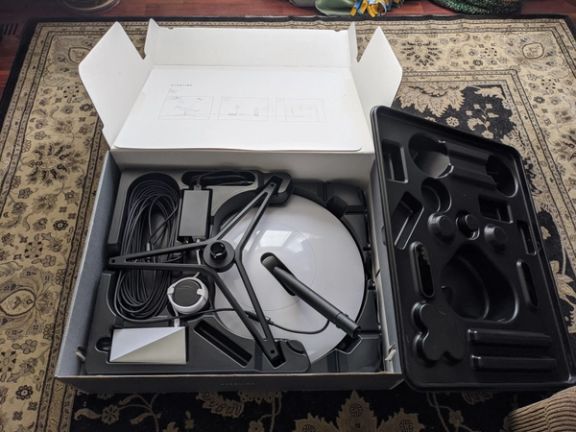
US NGO United Against Iranian Nuclear (UANI) has unveiled an initiative to provide internet services to Iranians in the face of state's access denial to citizens.

US NGO United Against Iranian Nuclear (UANI) has unveiled an initiative to provide internet services to Iranians in the face of state's access denial to citizens.
The group has managed to secure the initiative, Project Constellation, through the issuance of General License D-2, which authorizes an exemption to US sanctions for "discrete internet services".
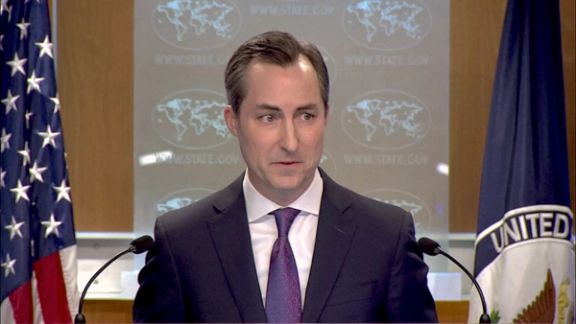
The US Department of State raised concerns about the Iranian regime's ongoing intimidation of the families of slain protesters and journalists.
Spokesman Matthew Miller noted on Thursday that this marks the fourth time in the last two weeks that Mahsa Amini's father has been summoned for questioning by the Iranian authorities.
He stated, "The world is watching its treatment of these families and the ongoing intimidation of journalists and abuse of peaceful protesters, and we will continue to watch it closely and take whatever steps are appropriate to respond to it."
The comments come in the wake of the recent release of approximately $6 billion in Iranian assets frozen abroad by the US government. This release is part of a larger deal that includes the exchange of five US prisoners held in Iran for five Iranians detained by the United States. However, the move has sparked controversy, with many Iranians condemning it as a “ransom payment”.
Notably, the hostage exchange deal left unresolved three other US cases – Jamshid Sharmahd, Afshin Vatani, and Shahab Dalili.
During a hearing before the Foreign Affairs Committee in Congress on Thursday, concerns were raised that the deal does not effectively deter further hostage-taking and allows the Iranian regime to divert resources meant for humanitarian purposes toward security forces, missile programs, and proxy groups. It also threatens to undermine the international sanctions regime.
However, Miller reiterated that the released funds would only be accessible to Iran for humanitarian purposes, such as acquiring food, medicine, and other necessities that directly benefit the Iranian people rather than the regime.
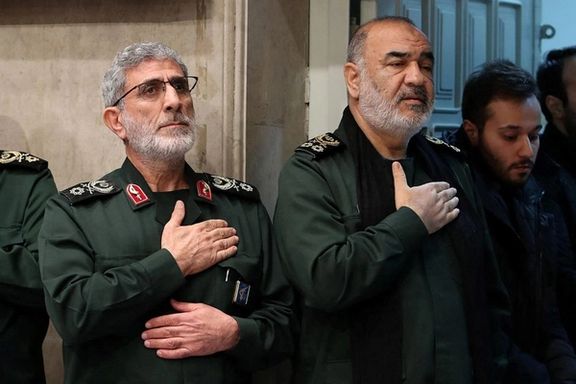
A rare criminal complaint was filed with Paris prosecutors on Thursday, targeting three senior Iranian officials from the regime's security apparatus.
The accusation against IRGC commander Hossein Salami, Intelligence Minister Esmail Khatib, and Quds force commander Esmail Qaani includes "death threats and justifying terrorism."
The six plaintiffs in the case are all exiled Iranians who have been living in France since the 1980s, and include a filmmaker, a journalist, a writer, and an LGBTQ+ rights activist. They have all taken public stances against Tehran, and their complaint, while largely symbolic, coincides with the first anniversary of Mahsa Amini's death last September, which sparked the Woman Life Freedom movement in Iran.
The threats were made in response to support for nationwide protests in Iran following the death of Mahsa Amini in custody of the morality police. One such threat came from Khatib on December 13, where he warned that "anyone playing a role in the riots will be punished, wherever they are in the world."
Additionally, on January 10, Salami himself made a statement regarding "the French people and the managers of [satirical anti-clerical magazine] Charlie Hebdo," suggesting they shouldn't concern themselves with Salman Rushdie's fate. This statement related to the fatwa against Rushdie issued by Iran's late leader Ayatollah Ruhollah Khomeini. The Charlie Hebdo staff had previously been targeted by jihadist gunmen in 2015 for publishing cartoons of the Prophet Mohammed.
Chirinne Ardakani, a French-Iranian lawyer from the Iran Justice Collective, characterized these threats as "disguised fatwas" against Iranian opposition activists worldwide.
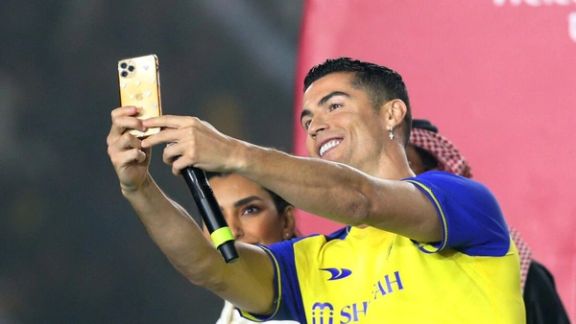
Saudi Arabia has urged Iran to provide unhindered internet access to Cristiano Ronaldo, the renowned footballer playing for Saudi Arabian team Al-Nassr during his stay in Iran.
Access to many international messaging apps and websites are blocked in Iran for both political and religious reasons.
The request comes in response to statements made by Iran's Minister of Tourism and Cultural Heritage, Ezzatollah Zarghami, who emphasized the necessity for Ronaldo to install Iranian domestic messaging apps during his visit to the country.
Zarghami's comments followed remarks made by the CEO of Persepolis Football Club during a live television program, where he discussed providing unfiltered SIM cards to Al-Nassr players traveling to Tehran for a match on September 19.
In the wake of significant reactions within the Persian-speaking online community regarding these statements, the official Saudi Arabian account, communicated in Persian, stating, "For the convenience of international stars and Al-Nassr team members during their time in Tehran, please recommend the best VPN."
The development has sparked discussions online, with some social media users viewing it as a potential source of embarrassment for the Islamic Republic.
During the last twenty years, Iran has implemented stringent internet censorship policies, curbing citizens' access to unrestricted information. This includes the blocking X, Facebook, Instagram and reputable news sources. Nevertheless, these constraints have been bypassed extensively through the widespread adoption of Virtual Private Networks (VPNs) and anti-filtering software.
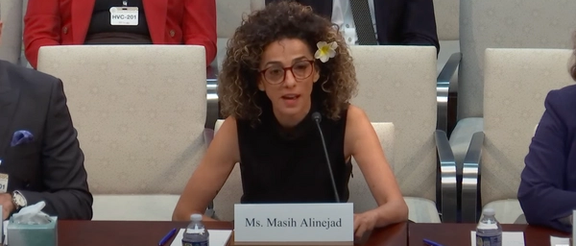
Iranian-American dissident Masih Alinejad says the Biden administration advised her to change her identity and disappear, in light of threats on her life by the Islamic Republic.
Appearing in a US House Foreign Affairs Committee hearing on Thursday, Alinejad revealed that she was offered witness protection, typically offered to people “whose lives are in danger as a result of their testimony against drug traffickers, terrorists, organized crime members and other major criminals,” as stated in the US Marshals Service website.
During the session, titled Iran’s Escalating Threats: Assessing US Policy Toward Iran’s Malign Activities, Alinejad also revealed that earlier this year the White House had warned her of at least 31 threats against her life.
“In an email, the administration strongly advised me to go into witness protection,” Alinejad said. “It means that I have to change my identity… to disappear. This is what exactly the Islamic Republic of Iran wants.”
The State Department is yet to respond to Iran International's request to provide comments on the issue.
The Biden administration has been heavily criticized this week for agreeing to release $6 billion frozen Iranian funds as part of a prisoner swap deal.
The criticism was echoed by some in the House Foreign Affairs Committee hearing, including Congressmen Rich McCormick (R-GA), Mike Lawler (R-NY) and House Foreign Affairs Committee Chair Michael McCaul (R-TX).
Masih Alinejad did also speak against the deal. She censured the Biden administration for showing “weakness” and trying “not to antagonize the ayatollahs”, claiming that the released funds will end up in the IRGC coffers, helping them in their attack on American interests as well as their suppression of the Iranian people.
“The money goes to the ‘morality police’ to kill more Mahsa Aminis,” she said, referring to the 22-year-old Kurdish Iranian woman whose death ignited the Women, Life, Freedom protests.
The rights activists added, “The money goes to the Revolutionary Guards to kill more children in Ukraine. The money goes to the relatives of the ayatollahs to actually promote Sharia laws to oppress more women in Iran.
“We all know that,” she concluded.
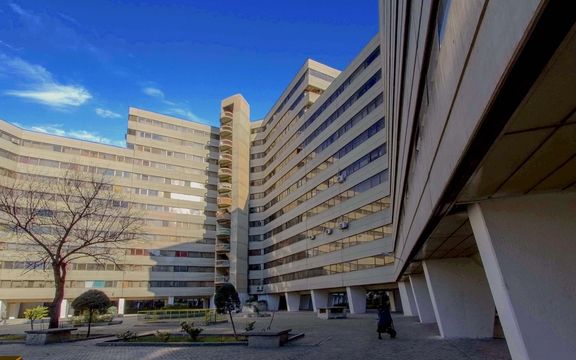
Ekbatan, in western Tehran, known for its resilience during last year's protests, is facing increased security measures to prevent fresh unrest on the anniversary.
Security forces and their plainclothes agents made their initial appearance in Ekbatan last week. They have already established checkpoints within the extensive middle-class apartment complex and have stationed special forces on motorcycles at various locations in and around the compound, including outside a mega mall and a hospital.
In preparation for the upcoming anniversary of Mahsa (Jina) Amini's death in custody of the morality police on September 16, 2022, residents have already begun nighttime chants from their windows. Slogans such as "Down with Khamenei," "Down with the child-killing regime," and "We will persist until the regime collapses, despite poverty, corruption, and high living costs," have echoed through the neighborhood in recent days.
“The sound of many people chanting echoed in the space between the apartment blocks and really scared the security forces. On several occasions they shot pellets and even live bullets indiscriminately at windows to stop people chanting,” Tara, a twenty-five-year-old resident told Iran International in an online chat. “It didn’t work. We returned and gave them more nightmares every night.”
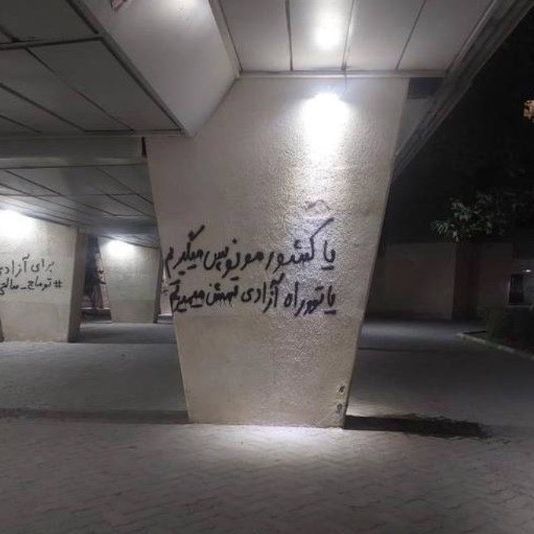
“Ekbatan was more active than other neighborhoods in Tehran because its structure and architecture made it difficult for security forces to control. Additionally, the residents’ community was and is much more tightly knit than in other neighborhoods,” Ashkan, a young man who manages Ekbatan protesters very popular Twitter, Telegram, and Instagram accounts told Iran International. “However, they have been familiarizing themselves with the terrain and become more dangerous,” he added.
Eight young men from Ekbatan who were accused of killing a member of the Basij militia during last year’s protests are still in prison and under great psychological and physical pressure to confess to the allegations that they all deny. “Just recently, they were moved from Rajai-Shahr prison to Ghezel Hesar,” Ashkan said. “They are still awaiting trial and are in very bad shape psychologically.”
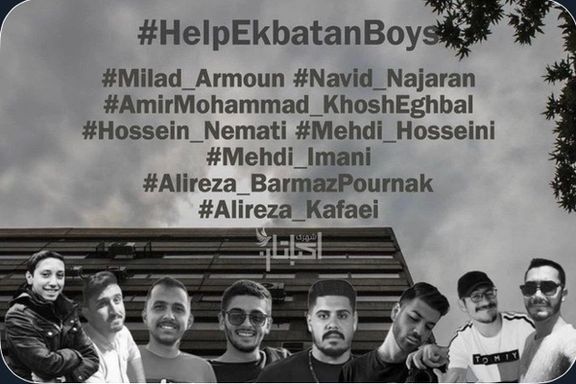
Protesters in Ekbatan often marched under the blocks at night and escaped into the vast green spaces when security forces raided them. They took refuge in one of the many entrances of the blocks, or hid in the apartments of the sympathetic residents who often left their doors open for them.
The five square-kilometer complex, with a population of 45,000 has over 15,500 apartments in 33 blocks built on wide columns. The columns under the blocks are a blank canvas for protesters to spray paint anti-regime graffiti. Ordered by security forces, the management of the blocks ensures that they quickly cover the graffiti with paint, but before long, more graffiti appears on the columns.
Complaining about the many disputes among expatriate groups over the leadership of the movement, Ashkan said protesters could have achieved much more if these disputes had not slowed down the movement. “This is a lengthy process, but anything can suddenly trigger massive protests again like Mahsa’s killing did last year,” he said but declined to comment on his own leadership preferences.
“I was personally very moved last year and became more determined when I saw the video showing Majidreza Rahnavard fighting so bravely for his rights in Mashhad, which is dominated by Basijis and corrupt hardliners. He was really fearless and fought like a hero," Ashkan said.
Rahnavard, 23, was the first of the seven young men executed in public for his involvement in the protests and the alleged stabbing of two Basijis in November 2022. He was hanged in public on December 12.
The Starlink satellite project website says "the US government has taken action to support the free flow of information to and from the Iranian people".
It explained: "This license is crucial as it helps keep Iranians online amid pervasive efforts of the Islamic Republic to censor and shut down the internet early and often when there is even a hint of protests being planned."
Mass shutdowns have left millions cut off from the internet across Iran as the government continues its blanket censorship in a bid to prevent more protests, leaving many without access to work and vital services.
Starlink receivers began to be smuggled into Iran last September, in case of the regime enforcing a total blackout. Starlink, operated by Elon Musk’s SpaceX, is a global network of low-orbit satellites that bypasses the terrestrial internet, and helped restore connectivity in Ukraine after the Russian invasion.
Project Constellation will also offer a fundraising platform, where supporters of the Iranian people can donate funds to send Starlink satellite internet terminals to keep Iranians online. "Based upon the best efforts of our confidential partners, UANI expects to achieve a high rate of Starlink systems successfully smuggled into Iran," the website said.






